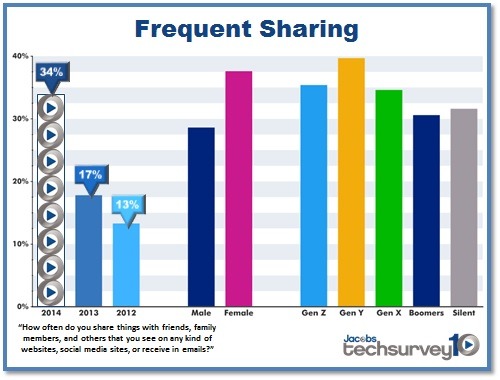Technology – combined with trust – is creating an entirely new transactional model and cultural mindset: sharing. And it’s growing fast.
You no doubt have heard of many startups that are based on the concept of sharing – using resources that are just gathering dust, and getting the most out of them by sharing them with others – at a price.
Of course, there’s Uber, but scores of other businesses and startups with similar but different models like Lyft. Zipcars allow consumers to escape the burden of buying or leasing a car to get from Point A to Point B. And then there’s Airbnb that allows people to literally share their apartments or homes while on vacation.
Venture capital is pouring into this space at record levels, and IPO rumors are flying. Sharing will be a topic this year at the DASH conference in Detroit because commuting and transportation are being impacted by the sharing economy as well.
But what about radio? What does sharing have to do with a broadcast medium and how can great stations benefit from this caffeinated level of sharing activity? And now we’re talking social sharing – the easy ability to be able to share interesting, compelling, funny, and useful things we run across on the web. Now you may be thinking that this is nothing new. But the sharing culture is changing, and at a rapid pace.
First and foremost, there’s a mindset shift occurring about sharing in the digital space, on mobile devices as well as desktops and laptops. Just as attitudes about a wide range of social issues from gay marriage to the legalization of marijuana are undergoing sweeping change, the idea of sharing resources with strangers or communities is becoming commonplace, too. We don’t keep good, interesting, provocative, or personal things to ourselves – we share them with others.
And it’s even easier in a medium like radio where sharing is not just becoming more commonplace – it’s becoming popular.
We have been tracking the propensity to digital share content among radio listeners in our Techsurveys – both the public and commercial radio versions – over the last several years. And something amazing is happening – consumers are becoming “serial sharers” at a very fast rate.
Consider the trend line for frequent sharing during our past three annual Techsurveys:
While this is a web-based survey, you can see the trajectory of change when it comes to those who share content with friends, family members, and others. It has more than doubled since 2012, and is especially common to women and Millennials. We will be presenting our Public Radio Techsurvey 6 in just a few days, and the growth of sharing is similar among fans of stations throughout the public media spectrum as well.
More and more, people love to share – just about anything: pictures, jokes, videos, philosophies, and their experiences. And they love to share them with others they know, like, follow, and love.
It is also the case that technology has made sharing easier and virtually seamless during the past few years. There’s a mental process that kicks in for many people when they read a great post, see a meaty tweet, or encounter a funny video on YouTube: they think about others in their communities who might appreciate it as well.
Thus, sharing is becoming a very powerful tool in content-rich environments. It explains, to a great degree, the burgeoning success of a Jimmy Fallon. Yes, people are watching the show on televisions and screens of all shapes and sizes. But they are also sharing his bits, skits, and videos at very high levels via video channels. Consumers want to get a jump on what’s new, what’s hot, and what’s compelling. And sharing allows them to do just that.
So how can radio cash in, during an era when marketing dollars are somewhere between sparse or nonexistent?
First, you have to have content that’s shareable. (More on that in a moment.)
Second, you have to make it easy to share. (A review of your social profiles, website, and other assets is always smart. How easy is it to share your best stuff?)
And third, you still have to remind people to share; that if they’re enjoying what they’re experiencing, why not share it with others? (Here’s where a look at your promotional inventory is a wise activity.)
Radio has thrived on the real-time model since its beginnings. A broadcast is aired, it goes out into the ether, and is never to be heard from again. But with podcasts, video, web content, and other resources, much of what stations produce every day can be (and should be) shared with fans.
Of course, it comes down to whether your show, your features, your interviews, your behind-the-scenes stuff are worth sharing. And given web metrics, we can see pretty quickly whether you’re creating content that is worthy of a few clicks, swipes, and touches – or not.
But qualitatively, there is truth, too. In every focus and L.A.B. group I conduct where there’s a viable morning and/or personality show in place, I am asking about bits, topics, or events that have been aired in the past couple of weeks that are memorable. For the great shows and personalities, the audience has no problem recalling example after example. But for others – even legacy shows – there may be high ratings but few prominent recent bits or moments. Thus, not much to share.
That’s the litmus test: are you creating moments and experiences that the audience is eager to share?
The distribution machine is in place and it’s getting bigger by the year if you are.
It’s time to carpe that diem because there’s never been a better time to get optimal digital mileage from your content.
Sharing is your best friend.
- What To Do If Your Radio Station Goes Through A Midlife Crisis - April 25, 2025
- A 2020 Lesson?It Could All Be Gone In A Flash - April 24, 2025
- How AI Can Give Radio Personalities More…PERSONALITY - April 23, 2025






Great column to jump start the week. Listeners sharing their favorite content can also be leveraged as a valuable (and budget friendly) component of your overall station marketing strategy.
Thanks, Andrew. My thought exactly – start the rest of the year with a practical and positive way for stations to make the most out of their content.
Welcome to the rest of 2014 and thanks for taking the time to post an early comment.